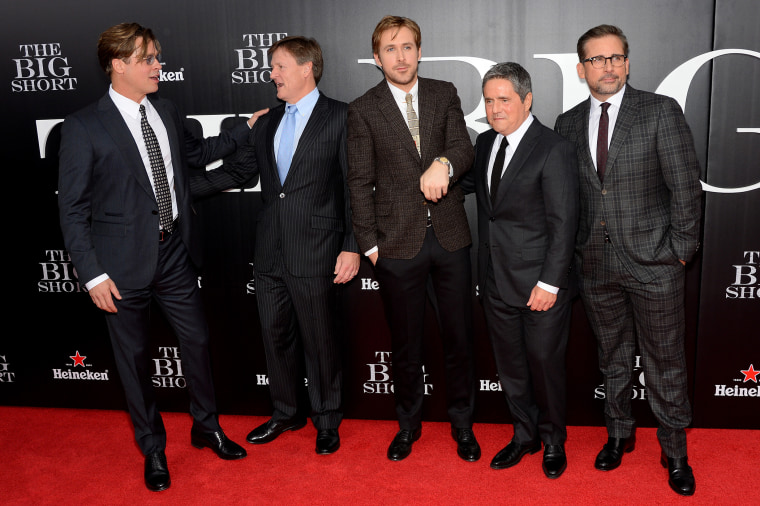The critically acclaimed dramedy "The Big Short," which opens in select cities Friday, is just the latest entry in a burgeoning new genre — the economic disaster film.
In the wake of the 2008 financial collapse and subsequent Great Recession, Hollywood has been striving to make sense of the fallout and provide catharsis without alienating paying audiences in the process.
"The Big Short" — which boasts an all-star cast including Steve Carrell, Brad Pitt, Christian Bale and Ryan Gosling, a popular director ("Anchorman" veteran Adam McKay) and considerable Oscar buzz — is poised to become a crossover success. That's due in part to the fact that it takes great pains to be accessible to viewers who aren't steeped in financial jargon. Another aspect of the film's unique appeal, according to a chorus of film critics, is its use of humor to diffuse inherently depressing subject matter.
RELATED: Holiday movie preview: Socially conscious films flood the marketplace
"Only in America, though, could filmmakers illuminate such a dire subject, and the financial debacle that ensued, with the sort of scathing wit, joyous irreverence and brilliant boisterousness that make 'The Big Short' an improbable triumph," writes Joe Morgenstern in his glowing review in The Wall Street Journal.
"This isn’t an explainer movie. It’s a full-on Hollywood Brad Pitt movie, whose purpose is to entertain, and perhaps to enrage, much more than it is to educate millions of people about the finer points of mark-to-market margin collateralization policies," adds Felix Salmon in a column for Fusion.
Hollywood has to walk a delicate balance, since they are ultimately turning a profit from stories that reflect misery inflicted on average Americans. In order to address that dichotomy, filmmakers often tap into the righteous anger of their audiences, and delineate bad guys to serve as the recipients of their rage.
"The Big Short," which is based on a Michael Lewis non-fiction best-seller, is unique because it has a "built-in happy ending," it tells the true story of a group of hedge fund managers who discovered that the housing bubble was about the burst and bet against the banks early enough to see a profit.
But the financial crisis genre doesn't always produce films that ended on a note of triumph.
The Oscar-nominated George Clooney hit "Up In the Air," released in 2009, when the Great Recession was at its peak, was steeped in the harsh realities of post-collapse economy. The film's director Jason Reitman once called the ongoing crisis the film's "location." While ostensibly a romantic comedy, Clooney's character had a profession that was anything but cuddly. He played a man who travels around the country delivering mass layoffs with his signature charm. In a particularly effective grace note, several of the the people you see being let go in the film are not actors, but real victims of downsizing. It was later revealed by Reitman that the non-actors thought they were appearing in a documentary.
"I was filmed [for 'Up in the Air'] a week before my job was ending. I was working, just knowing when my last day was. So it was really fresh for me. It was painful because I knew a week later, that that was it," Marlene Gorkiewicz, a former HR employee for an airline company, told The Daily Beast following the film's release.
The following year, the Ben Affleck-Kevin Costner film "The Company Men" was released. It portrayed the lives of fictional white collar workers suddenly plunged into unemployment amid the economic downturn. While not a huge critical or commercial success, the film was viewed as following in the footsteps of "Up in the Air," while presenting "the dehumanizing effects that losing a job can have on grown men."
Also in 2010, "Inside Job," a widely hailed documentary that served as an indictment of corruption in the financial services industry, became a financial success (by non-fiction standards) and won the Academy Award for Best Documentary feature.
In 2011, director J.C. Chandor's "Margin Call" took a far wonkier approach. Set almost entirely within the data-driven world of a Wall Street investment bank over the course of 36 hours, the film's character actor-filled cast (including Kevin Spacey, Jeremy Irons and Demi Moore) chew onto rapid fire figures and dialogue to paint a riveting portrait of a financial market free fall. While not quite a traditional thriller, the film was hailed for effectively conveying the behind-closed-doors tensions and greed that fueled the epic collapse of late 2008.
Not to be out done, television got into the mix that same year, with HBO releasing the Emmy-nominated miniseries "Too Big to Fail," which revisited the actions of the top government power players — including Bush-era Treasury Secretary Hank Paulson and Federal Reserve Chairman Ben Bernanke — in the run-up to the collapse of institutions like Lehman Brothers.
Still, "The Big Short" may benefit from more distance from the disaster, albeit with some of the same financial anxiety and apprehension ever present.
"It’s a movie, so you don’t want to act all crazy about it, but I hope in some small way it pushes some discussion," McKay told The Hollywood Reporter in a recent interview. "It’s kind of amazing that we had the largest collapse since the Great Depression, but we all seem to have forgotten. And not many of the problems were fixed.
